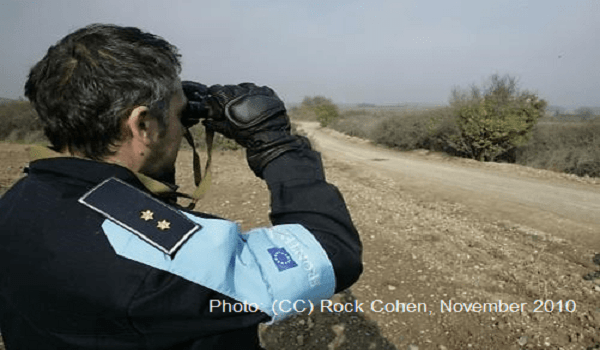The European Parliament voted by an overwhelming majority to freeze part of the European Border and Coast Guard Agency (Frontex) 2022 budget until it makes key improvements. NGOs have filed a complaint with the European Ombudsman over Frontex and other EU agencies supporting surveillance in third countries, in breach of EU rules. Dutch lawyers have filed a case with the EU General Court on behalf of a Syrian family deported to Turkey on a Frontex-operated flight, despite having lodged asylum claims in Greece.
Having seen its mandate and budget increase at rapid pace, Frontex is now the largest EU agency with a proposed 2022 budget of more than 750 million euro. However, as outlined by Mariana Gkliati and Jane Kilpatrick in a recent blogpost published by Open Government EU: “safeguarding transparency does not seem to have been prioritised at the same rate. The obstructive and secretive practices of the agency with regard to its activities in general and the access to information requests in particular has been broadly criticized”. Frontex has come under severe external scrutiny from institutions, organisations and legal bodies. The agency is currently subject to more than ten investigations by the European Parliament, the European Ombudsman, and the EU’s anti-fraud watchdog (OLAF), and faces scrutiny from NGOs and journalists as well.
By an overwhelming majority, the European Parliament on 21 October voted to freeze 12 per cent or 90 million euro of the Frontex 2022 budget until the agency ensures key improvements related to fundamental rights monitoring and financial, recruitment and procurement procedures. MEPs’ demands include the recruitment of 20 missing fundamental rights monitors and three deputy executive directors sufficiently qualified to fill these positions, the implementation of a mechanism for reporting serious incidents on the EU’s external borders, as well as a functioning fundamental rights monitoring system. MEPs Claire Daly, Cornelia Ernst and Sira Rego representing The Left group in the European Parliament wrote in a recently published op-ed: “Frontex is one of the core actors of the EU’s migration policy, based on the militarisation of borders and dehumanisation of people. Numerous complaints and reports from social organisations, as well as complaints from the victims themselves, reveal the role of Frontex and its persistent violations of fundamental rights”. Based on the same observations, the Swiss Migrant Solidarity Network is calling for a referendum to end Switzerland’s funding of Frontex, which amounts to more than 57 million euro (61 million CHF).
Frontex is among several EU agencies targeted by a complaint to the European Ombudsman filed by Privacy International and five other human rights organisations. The complaint relates to Frontex support for surveillance in third countries through the transfer of surveillance capabilities, equipment, and other support. According to these organisations: “EU institutions are under an obligation to conduct human rights risk and impact assessments prior to engaging in any form of surveillance transfer. Prior risk and impact assessments are needed to ensure that any surveillance transfer will not result to serious violations of the right to privacy or facilitate other serious violations of human rights”. Their research demonstrates that no human rights risk and impact assessments were carried out prior to working with authorities in third countries in most cases.
Lawyers from the Dutch human rights law firm Prakken d’Oliveira supported by NGOs including ECRE member Dutch Council for Refugees (DCR) have filed an action for damages before the EU General Court on behalf of a Syrian family deported to Turkey by Frontex in October 2016, shortly after arriving in Greece – despite having lodged asylum claims. The law firm states: “The Syrian family, with four young children between the ages of 1 and 7, applied for asylum in Greece in October 2016. Their request was registered by the local authorities. Eleven days later, the family was nonetheless deported by Frontex and Greek authorities and taken onto a plane to Turkey without any access to an asylum procedure. Nor was an official expulsion order presented. During the flight arranged by Frontex and with their staff present, the four young children were separated from their parents. More so, they were ordered not to speak to each other. In Turkey, the family was immediately imprisoned”. According to the law firm: “With the deportation, the family became victims of a so-called pushback, in which people are deported to a non-EU country without prior procedure”.
For further information:
- ECRE Frontex: Open Scrutiny Season for Scandal-ridden Border Agency, June 2021
- ECRE Policy Paper: Holding Frontex to Account: ECRE’s Proposal for Enhancing Nonjudicial Scrutiny Mechanisms, May 2021
Photo: (CC) Rock Cohen, November 2010
This article appeared in the ECRE Weekly Bulletin. You can subscribe to the Weekly Bulletin here.

